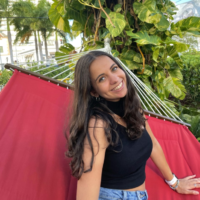Language can be ambiguous and confusing, even for adults. For example, sometimes two words that sound the same mean something very different, and sometimes words that sound very different have very closely related meanings! Homonymy, polysemy, and synonymy are just a few properties of language where the meanings and sounds of words interact. Let’s break down how these all play out.
Homonymy
Have you ever rolled your eyes at a cheesy pun? If so, you’re probably familiar with homonyms! Homonyms are two or more words that have the same spelling or pronunciation but different meanings. These can be broken down into two categories:
- Homophones are words that are pronounced the same but have different meanings. For example:
-
- To/too/two
- By/buy
- Here/hear
- Homographs are words that coincidentally have the same spelling but different meanings (and may or may not have the same pronunciation). Note that homographs exist only in written form– and not all languages have them, or even have a corresponding writing system at all! Some examples of homographs:
-
- Bear can be an animal, or it can be a verb meaning “to support or endure”
- Minute can be a unit of time, or it can be an adjective meaning “very small”
- Row can be a line, or it can be a verb meaning “to propel a boat”
Understandably, toddlers often have a difficult time learning homophones. Researchers suggest that this could be because the most common meaning of a word is overwhelmingly easier to remember, so it “blocks” them from considering other meanings when they hear it, or it could be the case that early on, they struggle to grasp the basic concept that known words can refer to multiple things. This brings us to…
Polysemy
Polysemes are words that have multiple related meanings. The English language is full of polysemy. For example:
- Foot can be a body part below the ankle, or the base of something
- Get can refer to physically obtaining something, or to understanding something
- Subject can refer to a matter being discussed, or a topic taught in school
Although this seems like it would cause confusion, polysemy may actually make word learning easier for young children by helping them extend a meaning they already know to a new situation, just like adults might. Children will even override shape bias to extend words to unfamiliar objects when they have learned that one word can refer to multiple things.
Synonymy
Synonyms are multiple words that sound different but mean the same thing as one another (or have very similar meanings!). Some basic examples are:
- Little/small
- Afraid/scared
- Start/begin
An interesting thing about synonyms is that they sometimes violate the mutual exclusivity principle, a general rule that children might use during word learning that says concepts tend to have one word to label them. Researchers have found that children are more likely to match a new word to an object they already know the word for IF they know they’ve heard people refer to it with a synonym, even if they can’t remember that synonym right then and there.
Figuring out the distinctions between homonymy, polysemy, and synonymy can be tricky, but hopefully now you have a better understanding of how they work! Most importantly, now you know that if you’ve ever criticized anyone for mixing up the use of there/their/they’re, that was an “ad homonym” attack (Sorry, I had to include a cheesy pun)!

Sophie Barry
Author
Sophie is a senior at Duke studying Psychology, Cultural Anthropology, and Spanish. She is interested in how infants learn words given the variability of input from their environments, specifically in the sense of hearing different accents. On campus, Sophie is the Jewish Student Union president, a Camp Kesem counselor, and a Duke Puppy Kindergarten volunteer. Outside of school, she enjoys doodling, traveling, and watching low-quality reality TV shows.